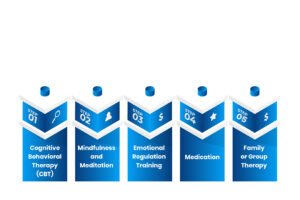Have you ever experienced a stressful situation, and felt alright about it, then only to be struck by a big wave of emotions later? It is referred to as delayed processing or delayed emotional response. Such feelings may not manifest at the same time, but they may appear days, weeks, or even months following the incident.
Similarly, this is an unconscious delayed reaction and may lead to stress or trauma adaptation. The knowledge of the reasons for delayed emotional response and the ability to identify them can make you better able to handle them. Therefore, it may be a result of stress, traumatic experiences, or unbearable circumstances, but delayed emotions should be addressed to avoid influencing your well-being in the long run.
What Is a Delayed Stress Response?
A delayed stress response is a situation in whereby the body or the mind is not able to respond immediately to a stressful situation. Rather, the stress will accumulate with time, and other feelings such as anxiety, anger, or sadness will be manifested later. It may occur after an important event, such as a traumatic experience, in which the mind then does not process the emotions immediately.
Indicatively, an individual may not be hurt immediately after a stressful situation, but weeks after the stress, the person may experience being overwhelmed or experience sleeping problems. Therefore, the body requires time to be up to date and to work through the emotions that were still on the back burner or suppressed temporarily. This is a slow response that may result in permanent problems later. Hence, it is essential to learn how to cope and find support where necessary.
Symptoms of Delayed Emotional Response
Delayed emotional response symptoms include the following:
- Experiencing numbness or a lack of feelings when under stress.
- Excessive feelings come up at a later stage.
- Difficulty with recognizing or naming feelings at the time.
- Experience that emotions are stagnant or put off to a later time.
Causes of Delayed Emotional Response
- Suppressing or averting feelings may lead to the emergence of feelings in the future.
- Past traumatic experiences may even slow down the emotional processing because the brain requires time to figure out the effect.
- Ongoing stress may overload the emotional system, leading to slow reactions.
- The situation in which the individual is out of touch with their emotions occurs in the case of stressful or overwhelming experiences.
- Societal pressures to lock up emotions may result in tardy reactions when the time comes and when it is safe to express them.
- Some neurological states or chemical imbalances may disrupt emotional processing and response.
Delayed Emotional Response Examples
The following are some examples of emotional response:
- Numbness in the first place, and anger/sadness in the second place.
- There is an absence of immediate post-loss sorrow, followed by intense grief later on.
- No pressure in the workplace, and then they end up feeling exhausted and irritable.
- Late emotional reaction to previous abuse, which results in depression or anger in the future.
- Feeling numb following shocking news, and then being emotional later.
Delayed Emotional Response Trauma
Delayed emotional response trauma occurs when one goes through a stressful or traumatic situation but fails to exhibit emotional distress. Rather, there is a delay in the emotional response, in some cases, taking days, weeks, or even more.
Likewise, this is possible since the brain requires time to process this event. At the very outset, people may experience numbness, detachment, or a lack of full awareness of the extent of impact of the event on them. As time goes by, they might manifest as anxiety, sadness, or anger, which might be too much.
In addition, the delayed trauma reaction may have an influence on the relationships and the life of a person. They may not cope with mood swings, flashbacks, or even bodily complaints such as headaches or fatigue. The sufferers of delayed emotional responses should also seek help when they are ready. They can realize that these feelings were the natural way to react to stress, and this will make them start the healing process.
Delayed Emotional Response ADHD
One of the common problems is delayed emotional response in ADHD. People with ADHD can have a problem with a delay in processing and responding to emotional situations. As an example, they may not respond immediately to something upsetting, but they will be flooded hours or even days later.
This latitude reaction may be frustrating to the individual with ADHD, as well as to the individuals surrounding them. The emotional lag can be explained by the fact that it is rather hard to control emotions, and it is one of the challenges in ADHD.
Furthermore, this slowed-down stress response may have impacts on relationships and day-to-day functioning. The emotional response that finally comes out may seem like a very big reaction to the event. Thus, it is capable of misunderstanding or bewilderment. Individuals who have ADHD might have difficulties communicating their feelings at a particular moment.
Delayed Emotional Response Autism
Autism delay with Emotional Response is another problem. Autistic individuals do not necessarily respond to events by acting in a certain emotional manner. They may require additional time to take in what is going on around them. In lieu of that, they might not respond immediately, but they might get overwhelmed in the future in case of something upsetting. This latency may at times cause the people around the autistic person to know what the person is going through.
In addition, delayed emotional reaction is a frequent occurrence that is attributable to the fact that autistic individuals react to emotions in different ways. They may not be able to vent their emotions as they happen, and this may result in frustration. The consequences of such delayed responses over time are misunderstandings in social situations. Hence, understanding this pattern would allow people with autism and their families to devise more appropriate communication strategies.
How to Deal with Delayed Emotional Response?

1.Acknowledge the Delay
The first step to handling emotional responses is to understand that they can be delayed. When you realize there is a slow response, you cannot ignore it. Realize that it is normal in processing emotions, particularly in those individuals with disorders such as ADHD or autism. Giving oneself or other people time to process assists in lessening frustration. The understanding has the potential to create emotional control in the long run.
2.Create a Calm Environment
One could be provided with a quiet and peaceful environment, allowing them to process their emotions without being overwhelmed by additional stimuli. The calm atmosphere enables people to be more relaxed in unleashing feelings when they can take their time. This decreases the stress of immediate responses. It creates room to reflect and have slow emotional purges.
3.Promote Open communication
Open and non-judgmental conversations are important when addressing delayed emotional responses. People should be encouraged to speak without being hurried because it will make them feel secure. This enables them to handle emotions comfortably. Active listening also enhances comprehension among people.
4.Apply Emotional Regulation Skills
The accumulation of emotions can be managed with the help of emotional control methods such as deep breathing or mindfulness. The methods help to bring oneself down until the emotions take over. These approaches can also be enhanced with time as they are practiced regularly. Consistency should be promoted to achieve greater self-control in emotional delays.
5.Seek Professional Support
Professional assistance might be required to deal with delayed emotional reactions in certain cases. Customized measures to overcome emotional delays can be supplied by therapists, counselors, or experts in the field of behavior. They can educate on methods of trigger identification and enhancing emotional consciousness. Professional guidance can help one know their emotional patterns.
Delayed Emotional Response Treatment

1.Cognitive Behavioral Therapy (CBT)
The delayed emotional responses can be effectively treated using Cognitive Behavioral Therapy (CBT). CBT also learns skills in emotion regulation that could help in enhancing the response of an individual to situations in the long run. It also assists in the realization of the relationship between feelings and actions. CBT is also capable of minimizing the delay in emotional responses and encouraging more positive coping mechanisms with practice.
2.Mindfulness and Meditation
Meditation and mindfulness are potent mechanisms of dealing with delayed emotional responses. These methods promote the emphasis on the present, anxiety reduction, and the relaxation of the mind. In mindfulness, people get to know how to watch their feelings without passing judgment; thus, they can process their feelings as they manifest themselves.
3.Emotional Regulation Training
Individuals who have difficulties with the delay of emotional responses require emotional regulation training. This therapy is aimed at educating individuals in how to identify, interpret, and control their emotions in the present. Certain skills, including recognizing emotional triggers, self-soothing, and coping mechanisms, are gained. It is a slow journey that ultimately results in emotional management change in the long run.
4.Medication
In other instances, medication can be used to assist in the management of delayed emotional responses with particular reference. Antidepressants or mood stabilizers, or anti-anxiety medications, may help control mood and calm down emotional intensity. Therefore, these medicines can be used as a supplement to other treatment plans that are under implementation. Nevertheless, the prescription and monitoring of medication should be done under the supervision of a healthcare professional.
5.Family or Group Therapy
There can be valuable assistance to persons who have delayed emotional responses through family or group therapy. These forms of therapy offer them a secure environment to talk about their feelings, develop communication ability, and receive training on how to react to emotional stimuli. Family or peer support could be used to provide an understanding environment, and it is easier to process emotions. It promotes sympathy and enhances connections as well. Group interaction helps people experience and acquire new coping skills.
Closing Remarks
Delayed emotions are typical responses to trauma, stress, or overwhelming situations. They happen when the emotions are repressed or the mind is slow in making sense of the consequences of a traumatic incident. It might be confusing or frustrating, but it should be noted that these delayed reactions are natural.
Moreover, the therapeutic interventions comprise Cognitive Behavioral Therapy (CBT), trauma-focused therapy, mindfulness interventions, and emotional processing interventions. The treatments assist people in coping with their emotions, becoming emotionally stable, and overcoming the trauma. It is important to get professional assistance when emotional reactions disrupt normal life or continue to act in the long term. Likewise, Mental Behavioral gives in-depth knowledge and elaboration on these emotional responses and how they are treated. It is very useful to those who need detailed insights and encouragement.
FAQs
What is a serious delayed response to trauma?
The delayed reactions to trauma are among the most severe, especially when related to such aspects of emotional expression as anxiety, anger, or sadness manifested substantially following the traumatic event.
What causes delayed emotional response?
Delays in the emotional responses were normally caused by the repressed feelings, trauma, stress, or shock. It is also possible that the brain needs some time to process shocking events, and the feelings will only be expressed when the brain is ready.
How can I tell if my delayed emotional response is affecting my mental health?
You have been in a constant state of distress, as the lack of emotional responses has shaken your daily routine. The harming of symptoms such as anxiety, irritability, or excessive sadness is a typical symptom that can demand expert help.
Can delayed emotional responses be prevented?
It is hard to eliminate the delayed emotional responses; the intensity of the delayed reaction can be alleviated by mindfulness, emotional expression, and stress management, which are healthy coping strategies.
How long does a delayed emotional response last?
Varied time periods might take place in a delayed emotional response. Depending on the person and the severity of the trauma, it may take a few weeks to months. The unresolved trauma may leave a person with some emotional residues in the form of residual feelings that may persist longer in the life span.








